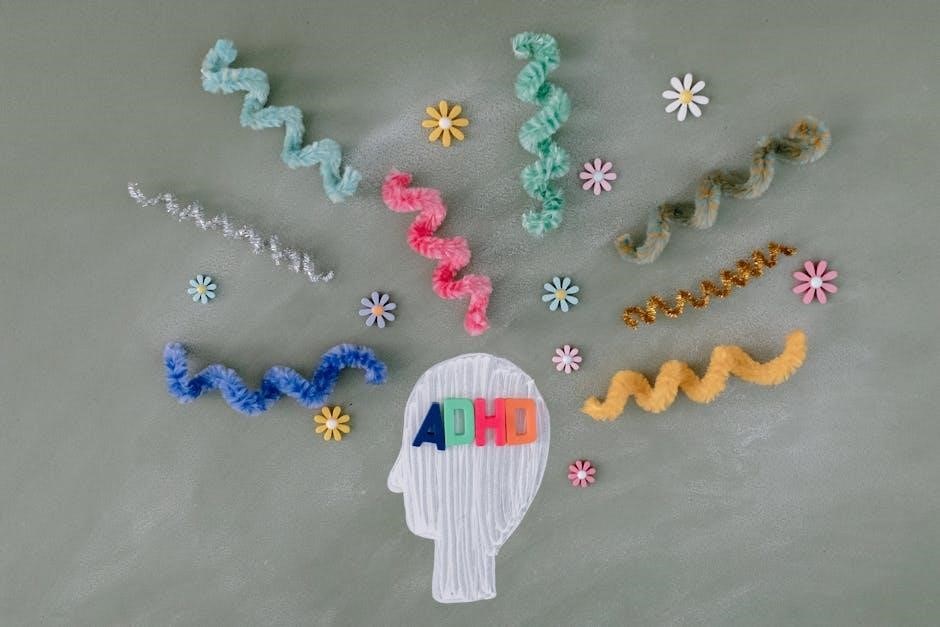Abnormal psychology explores the nature, causes, and treatment of mental disorders, emphasizing empirical methods to address social and mental health issues like depression and rumination.
Susan Nolen-Hoeksema’s work highlights the importance of understanding mental health challenges, offering insights into the complexities of human behavior and emotional well-being.
The field encourages empathy, critical thinking, and evidence-based interventions, making it vital for improving mental health care and fostering a deeper understanding of psychological disorders.
1.1 Overview of Abnormal Psychology
Abnormal psychology is the scientific study of mental disorders, focusing on their causes, symptoms, and treatments. It applies empirical methods to understand mental health challenges, addressing issues like depression, anxiety, and personality disorders. The field emphasizes evidence-based approaches to diagnose and intervene in psychological distress. Susan Nolen-Hoeksema’s work highlights the importance of understanding these conditions through research and real-world applications, making it a cornerstone for students and professionals in mental health care.
1.2 Importance of Studying Abnormal Psychology
Studying abnormal psychology is crucial for understanding mental health challenges, improving diagnosis, and developing effective treatments. It equips professionals with the tools to address disorders like depression and anxiety, enhancing care and reducing stigma. Susan Nolen-Hoeksema’s research emphasizes the need for evidence-based interventions, promoting empathy and critical thinking. This field fosters a deeper understanding of human behavior, ultimately benefiting individuals and society by advancing mental health care and awareness.
1.3 Brief Biography of Susan Nolen-Hoeksema
Susan Nolen-Hoeksema was a renowned psychologist and author, best known for her work in abnormal psychology and mental health. Born in 1959, she dedicated her career to understanding mental health challenges, particularly depression, rumination, and women’s mental health. Her textbook Abnormal Psychology became a trusted resource, blending empirical research with engaging narratives. Nolen-Hoeksema’s contributions emphasized evidence-based approaches and empathy. She passed away in 2013, leaving a legacy of impactful research and educational materials that continue to influence the field of psychology.

Structure and Content of the Textbook
Nolen-Hoeksema’s textbook is meticulously organized, blending empirical research with engaging narratives to explore mental health challenges, offering a comprehensive and accessible guide for students and professionals alike.
2.1 Organization of the Book
Nolen-Hoeksema’s textbook is structured to provide a logical progression through abnormal psychology, beginning with foundational concepts and advancing to specific disorders and interventions.
Each chapter is organized to build on previous material, ensuring a comprehensive understanding of the field, with clear headings and subheadings for easy navigation.
The book integrates real-world case studies, research findings, and practical applications, making complex topics accessible to both students and professionals.
Key features include detailed explanations of diagnostic criteria, treatment approaches, and cultural considerations, ensuring a well-rounded perspective on mental health.
2.2 Key Features of the Textbook
Nolen-Hoeksema’s textbook is renowned for its comprehensive coverage of abnormal psychology, incorporating real-world case studies, research findings, and practical applications.
Key features include updated discussions on ethics, cultural considerations, and evidence-based treatments, ensuring relevance and depth.
The book is available in multiple formats, including PDF, making it accessible for diverse learning preferences.
Its clear structure and integration of empirical methods address social and mental health issues, such as depression and rumination, providing a robust educational resource.
2.3 Availability of the PDF Version
The PDF version of Abnormal Psychology by Susan Nolen-Hoeksema is widely available online, offering convenient access to the textbook’s content.
It can be downloaded instantly, with public access settings allowing users to obtain it without restrictions.
Several editions, including the 6th and 9th, are accessible in digital format, catering to different learning needs.
Students and researchers can easily find and download the PDF through academic databases or online platforms, making it a valuable resource for studying mental health disorders.
Some versions may require purchase, but many are available for free, ensuring accessibility for a broad audience.

Theoretical Foundations
Abnormal psychology is grounded in biological, psychological, and sociocultural perspectives, providing a comprehensive understanding of mental disorders.
Susan Nolen-Hoeksema’s work emphasizes empirical research and theoretical frameworks to explore mental health challenges.
Her response styles theory highlights the role of rumination in exacerbating conditions like depression.
3.1 Biological Perspective
The biological perspective in abnormal psychology focuses on genetic, neurological, and hormonal factors influencing mental disorders. Research highlights how imbalances in neurotransmitters, such as serotonin and dopamine, contribute to conditions like depression and anxiety. Brain structure abnormalities and genetic predispositions are also explored as potential causes of psychological distress.
Susan Nolen-Hoeksema’s work emphasizes the role of biological mechanisms in mental health, particularly in understanding the interplay between biological and environmental factors. This perspective underscores the importance of pharmacological interventions and biological treatments in addressing mental disorders.
3.2 Psychological Perspective
The psychological perspective examines mental disorders through cognitive, emotional, and behavioral lenses. It emphasizes how thought patterns, emotional responses, and learned behaviors contribute to psychological distress. Cognitive-behavioral theories suggest that irrational thinking and maladaptive coping mechanisms play a central role in disorders like depression and anxiety.
Susan Nolen-Hoeksema’s research highlights the impact of rumination, where repetitive negative thinking exacerbates distress. This perspective underscores the importance of psychological interventions, such as cognitive-behavioral therapy, in addressing and treating mental health issues effectively.
3.3 Sociocultural Perspective
The sociocultural perspective emphasizes the role of cultural norms, societal expectations, and interpersonal relationships in shaping mental health. It examines how cultural background influences symptom presentation, diagnosis, and treatment of disorders. Susan Nolen-Hoeksema’s work highlights the importance of understanding gender differences in mental health, such as women’s susceptibility to depression due to sociocultural factors. This perspective advocates for culturally sensitive interventions, recognizing that mental health is deeply intertwined with one’s social and cultural context. It underscores the need to adapt treatments to diverse cultural backgrounds to enhance effectiveness and accessibility.
Classification and Assessment
Classification systems like DSM-5 standardize mental disorder diagnoses, ensuring consistency. Assessment tools include interviews, behavioral observations, and cultural considerations to provide comprehensive evaluations of mental health conditions.
4.1 DSM-5 Classification System
The DSM-5 provides standardized criteria for diagnosing mental disorders, ensuring consistency among professionals. It categorizes conditions based on symptoms, severity, and impact on functioning. Updates in the DSM-5 include new disorders and revised criteria, reflecting current research. This system aids in accurate diagnosis, treatment planning, and insurance reimbursement; It also considers cultural factors, enhancing its applicability across diverse populations. The DSM-5 is widely used in clinical and research settings, making it a cornerstone in abnormal psychology.
4.2 Assessment Tools and Techniques
Assessment in abnormal psychology involves clinical interviews, psychological tests, and behavioral observations. These tools help diagnose disorders and understand symptom severity. Standardized tests, like questionnaires, measure specific traits or conditions. Behavioral observations allow clinicians to note visible symptoms. Neuropsychological assessments evaluate cognitive and emotional functioning. Together, these methods provide a comprehensive understanding of an individual’s mental health, aiding in accurate diagnosis and effective treatment planning.
4.3 Cultural Considerations in Assessment
Cultural considerations are crucial in abnormal psychology assessments to ensure accuracy and sensitivity. Cultural norms, values, and beliefs shape mental health expressions and interpretations. Clinicians must avoid ethnocentric biases and use culturally validated assessment tools. Language barriers and cultural identity can influence test results, requiring adaptability and awareness. Recognizing these factors ensures fair and effective evaluations, promoting equitable mental health care across diverse populations.

Anxiety Disorders
Anxiety disorders involve excessive fear and stress, impacting daily life. Types include generalized anxiety, panic disorder, and social anxiety. Causes are biological, psychological, and environmental. Treatments include CBT and medication.
5.1 Types of Anxiety Disorders
Anxiety disorders encompass a range of conditions characterized by excessive fear and stress. Key types include generalized anxiety disorder (chronic, pervasive worry), panic disorder (sudden panic attacks), and social anxiety disorder (fear of social situations). Specific phobias involve intense fear of particular objects or events, while agoraphobia entails fear of places that might cause panic. These disorders significantly impact daily functioning and quality of life, often requiring tailored interventions to manage symptoms effectively.
5.2 Causes and Risk Factors
The causes of anxiety disorders are multifaceted, involving biological, psychological, and sociocultural factors. Biological factors include genetic predisposition and imbalances in neurotransmitters like serotonin. Psychological elements such as personality traits and cognitive distortions also play a role. Sociocultural influences, like family dynamics and societal pressures, can exacerbate symptoms. Additionally, stressful life events, trauma, and substance abuse are significant risk factors. Understanding these factors helps in developing targeted interventions to address the root causes of anxiety disorders and improve treatment outcomes. Early identification of these risks is crucial for effective management.
5.3 Treatment Options
Treatment for anxiety disorders often involves psychotherapy, such as cognitive-behavioral therapy (CBT), which helps individuals identify and change negative thought patterns. Relaxation techniques and exposure therapy are also effective. Pharmacological interventions, including SSRIs and SNRIs, can alleviate symptoms. Combining therapy and medication often yields better outcomes. Self-help strategies, such as mindfulness and lifestyle changes, can complement professional treatments; Early intervention and personalized treatment plans are key to managing anxiety effectively and improving quality of life.

Mood Disorders
Mood disorders, such as depression and bipolar disorder, involve persistent emotional disturbances. Causes include biological, psychological, and sociocultural factors. Treatment often combines psychotherapy and medication.
6.1 Major Depressive Disorder
Major depressive disorder (MDD) is characterized by persistent sadness, loss of interest, and impaired functioning. It is one of the most common mood disorders, affecting millions worldwide. Causes include genetic, biological, and psychological factors, with rumination often exacerbating symptoms. Nolen-Hoeksema’s research highlights gender differences, noting higher prevalence in women. Treatment typically involves psychotherapy, such as cognitive-behavioral therapy (CBT), and pharmacological interventions like SSRIs. Early intervention is crucial to improve quality of life and reduce suicide risk.
6.2 Bipolar Disorder
Bipolar disorder is characterized by extreme mood swings, including manic highs and depressive lows. It is categorized into Bipolar I and II, with I involving severe manic episodes. Genetic and biological factors contribute to its development. Nolen-Hoeksema’s work emphasizes the complexity of this disorder, often misdiagnosed as depression. Treatment typically involves mood stabilizers and psychotherapy to manage symptoms and improve quality of life.
6.3 Suicide and Self-Harm
Suicide and self-harm are critical concerns in abnormal psychology, often linked to severe mental health struggles. Suicide involves intentional death, while self-harm refers to deliberate injury without fatal intent. Both behaviors are frequently associated with depression, trauma, and emotional dysregulation. Nolen-Hoeksema’s research highlights the role of rumination in exacerbating distress, increasing suicide risk. Warning signs include mood shifts, withdrawal, and expressions of hopelessness. Early intervention, therapy, and support systems are vital for prevention and recovery.

Personality Disorders
Personality disorders involve long-term patterns of thought and behavior that deviate from societal norms, affecting daily life and relationships. They are categorized into different types, such as borderline and narcissistic disorders. These conditions often stem from a combination of genetic, environmental, and psychological factors. Diagnosis typically involves comprehensive assessments, and treatment may include psychotherapy or medication to manage symptoms and improve functioning.
7.1 Types of Personality Disorders
Personality disorders are categorized into three clusters based on shared characteristics. Cluster A includes paranoid, schizoid, and schizotypal disorders, marked by odd or eccentric behavior. Cluster B encompasses borderline, narcissistic, histrionic, and antisocial disorders, characterized by dramatic or erratic behaviors. Cluster C includes avoidant, dependent, and obsessive-compulsive disorders, often involving anxious or fearful traits. These classifications help in diagnosing and understanding the specific patterns of thoughts, feelings, and behaviors associated with each disorder, as outlined in the DSM-5 and discussed in Nolen-Hoeksema’s work.
7.2 Etiology and Development
Personality disorders arise from a combination of biological, psychological, and sociocultural factors. Biological influences include genetic predispositions and neurotransmitter imbalances. Psychological factors involve early life experiences, such as trauma or attachment issues, which shape maladaptive thought patterns. Sociocultural factors, like family dynamics and societal norms, further contribute to the development of these disorders. Understanding these elements is crucial for effective intervention, as highlighted in Nolen-Hoeksema’s work, which emphasizes the interplay of these factors in the progression of personality disorders.
7.3 Treatment Approaches
Treatment for personality disorders often involves psychotherapy, with cognitive-behavioral therapy (CBT) and dialectical behavior therapy (DBT) being highly effective. These approaches focus on identifying and changing maladaptive thought patterns and behaviors. Pharmacological interventions may also be used to manage symptoms, particularly for disorders with co-occurring mood or anxiety issues. Nolen-Hoeksema’s work emphasizes the importance of tailored treatment plans, combining psychotherapy with medication when necessary, to address the unique needs of each individual and promote long-term recovery and emotional stability.
Research Methods in Abnormal Psychology
Empirical methods, Boolean logic, and advanced search strategies are essential tools for investigating mental health issues, as highlighted in Nolen-Hoeksema’s work on depression and rumination.
8.1 Types of Research Designs
Research in abnormal psychology employs various designs, including experimental, correlational, and longitudinal studies, to explore mental disorders.
Experimental designs test causal relationships, while correlational studies identify patterns and associations.
Longitudinal studies track changes over time, providing insights into disorder development and progression.
Case studies offer in-depth analysis of individuals, aiding in understanding rare or complex conditions.
These methods, as discussed in Nolen-Hoeksema’s work, are essential for advancing psychological knowledge and improving interventions.
8.2 Ethical Considerations
Ethical considerations in abnormal psychology research are paramount to ensure the well-being of participants and the integrity of studies.
Principles such as informed consent, confidentiality, and minimizing harm are essential to protect participants’ rights.
Researchers must also avoid biases and ensure diversity in study samples to generalize findings accurately.
Nolen-Hoeksema’s work underscores the importance of ethical practices in addressing mental health issues.
Violating ethical standards can lead to legal consequences and undermine public trust in psychological research.
8.3 Interpreting Research Findings
Interpreting research findings in abnormal psychology requires careful analysis of data to understand patterns, correlations, and causal relationships.
Researchers must consider sample size, methodology, and potential biases to ensure valid and reliable conclusions.
Nolen-Hoeksema’s work emphasizes the importance of empirical evidence in addressing mental health issues like depression and rumination.
Findings should be contextualized within broader psychological theories to inform effective interventions and treatments.
Accurate interpretation ensures that research contributes meaningfully to the field and improves mental health care practices.

Treatment and Intervention
Effective treatments for mental disorders include psychotherapy, medication, and alternative therapies, emphasizing evidence-based approaches to restore mental health and improve patients’ quality of life.
9.1 Psychotherapy Approaches
Psychotherapy is a cornerstone of mental health treatment, offering various approaches to address psychological distress. Cognitive-behavioral therapy (CBT) focuses on identifying and changing negative thought patterns, while psychodynamic therapy explores underlying unconscious conflicts. Humanistic approaches, such as person-centered therapy, emphasize personal growth and self-actualization. Susan Nolen-Hoeksema’s work highlights the importance of evidence-based therapies tailored to individual needs, ensuring effective and personalized intervention strategies.
9.2 Pharmacological Interventions
Pharmacological interventions play a crucial role in managing mental health disorders, offering targeted relief from symptoms. Antidepressants, such as SSRIs, are commonly prescribed to treat depression and anxiety by regulating neurotransmitter levels. Antipsychotics are used for conditions like schizophrenia, helping to reduce hallucinations and delusions. Susan Nolen-Hoeksema’s work underscores the importance of combining medication with psychotherapy for comprehensive treatment plans, ensuring a balanced approach to mental health care.
9.3 Alternative Therapies
Alternative therapies offer complementary approaches to traditional treatments, focusing on holistic well-being. Techniques like mindfulness-based stress reduction and yoga help manage symptoms of anxiety and depression by promoting relaxation and self-awareness. Art therapy and music therapy also provide creative outlets for emotional expression. These methods, while not standalone cures, can enhance conventional treatments and improve overall mental health outcomes when integrated into a comprehensive care plan.

Legal and Ethical Issues
Legal and ethical issues in abnormal psychology involve patient rights, confidentiality, informed consent, and malpractice, ensuring respect and protection for individuals in mental health care.
10.1 Patient Rights and Confidentiality
Patient rights and confidentiality are fundamental in abnormal psychology, ensuring individuals’ autonomy and privacy are respected during mental health care.
Confidentiality protects personal information, fostering trust between patients and professionals, while patient rights guarantee informed consent and freedom from discrimination.
Legal frameworks, such as HIPAA in the U.S., enforce these protections, balancing privacy with effective treatment and ethical practice in mental health settings.
10.2 Informed Consent
Informed consent is a legal and ethical requirement in mental health care, ensuring patients fully understand and agree to treatment options.
It involves providing clear information about procedures, risks, benefits, and alternatives, enabling patients to make autonomous decisions.
This principle respects patient rights and promotes trust in the therapeutic relationship, while also protecting practitioners legally.
Proper documentation and capacity to consent are essential, ensuring ethical standards are maintained in all psychological interventions.
10.4 Malpractice and Liability
Mental health professionals must adhere to legal and ethical standards to avoid malpractice, ensuring they provide competent and responsible care.
Liability arises when negligence or improper treatment causes harm, potentially leading to legal consequences.
Practitioners must stay updated on best practices and guidelines to minimize risks and maintain professional integrity.
Understanding malpractice laws and maintaining thorough documentation are crucial for protecting both patients and practitioners.
